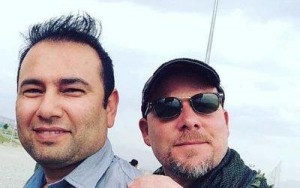An American photojournalist and Afghan interpreter working for U.S.-based National Public Radio were killed on Sunday afternoon after their vehicle came under fire in southern Afghanistan.
David Gilkey, 50, and Zabihullah Tamanna, 38, were on assignment and traveling with the Afghan army near Taliban-contested Marjah district in Helmand province when their vehicle was hit by “shellfire,” according to a NPR statement. Two other NPR staff, Tom Bowman and producer Monika Evstatieva, were unhurt.
“We are devastated by the death of David and Zabihullah,” Jarl Mohn, NPR’s chief executive officer, said in the statement. “Horrific incidents like this remind us of the important role journalists play in America’s civic life.”
At least 24 journalists and media workers have been killed in Afghanistan since 2001, according to the Committee to Protect Journalists. One-third of them were international reporters. The deadliest attack on media workers since 2001 occurred in January, when seven Afghan Tolonews channel staff were killed in Kabul, the capital. A policeman shot at Associated Press journalists in 2014, killing a photographer and wounding a reporter.
Journalist Deaths
“Even though much of the world’s attention has shifted away, let no one doubt that Afghanistan remains a dangerous place for journalists — local and foreign — working to cover that protracted conflict,” Bob Dietz, CPJ’s Asia program coordinator, said in a statement.
Journalists killed in connection with their work or for unclear reasons almost doubled to 110 in 2015 compared with the previous year, according to a report by Reporters Without Borders. Syria and Iraq remained the world’s deadliest countries for the journalists, it said.
Gilkey received numerous national and international awards throughout his career, such as the Edward R. Murrow Award in 2015. He was honored by the White House Photographers Association and was named Still Photographer of the Year in 2011.
“David has been covering war and conflict in Iraq and Afghanistan since 9/11,” Michael Oreskes, NPR’s senior vice president of news, said in the statement. “He was devoted to helping the public see these wars and the people caught up in them. He died pursuing that commitment.”
bloomberg.com



